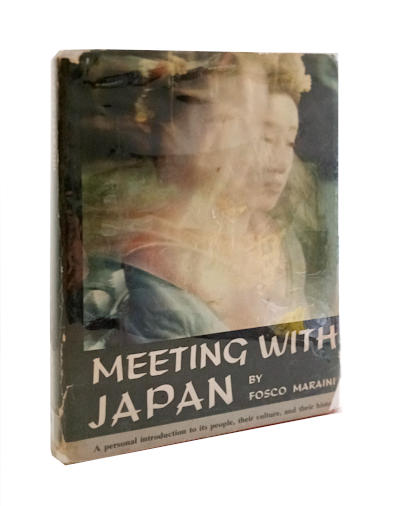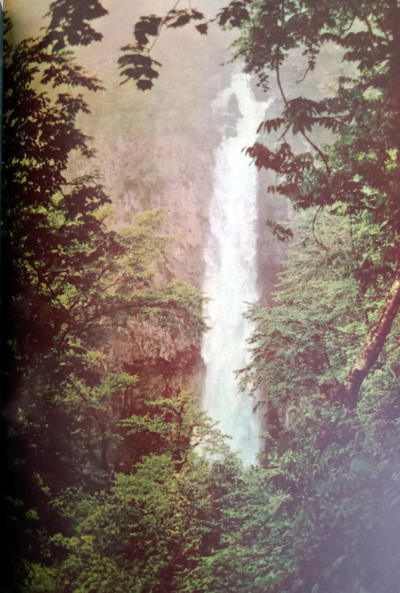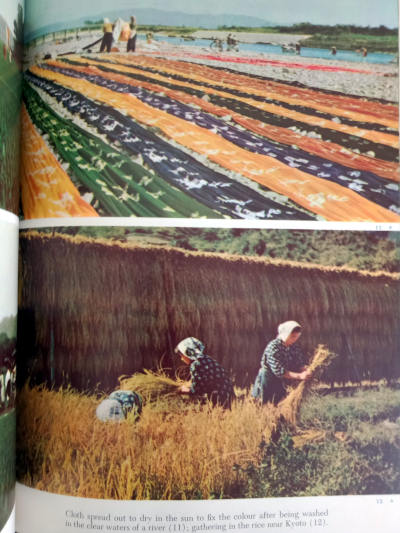About the book (from jacket flap):
For all that we have come to know about Japan in recent years, there is probably still no country more alien to us, more exotic in the true sense. This magnificently imaginative and penetrating book offers a personal introduction to the Japanese of today, their age-old culture, and their history. It is the work of a highly intelligent, richly informed, and observant Italian scholar, linguist and photographer, who spent many years there as a teacher, as a wartime internee, and recently as a sympathetic traveler. Though presented in personal terms and partly in the form of a travelogue, it is a cultural history on a very high level. It is one of those books, of the order of Arabia Deserta and Mont-Saint-Michel and Chartres, which rise up from time to time as singular landmarks on our literary horizons.
Arriving in Tokyo on his last visit, in 1955, the author introduces us to some of his friends and acquaintances. We share elegant meals with them, enjoy their fetes, their baths, their theaters and other pleasures, visit their shrines and walk their busy streets. WE travel with them by car and train through strange landscapes, visit Nara with its sacred forest; Kyoto with its imperial relics and Zen temples; Nagoya, where the author lived and was interned under horrifying conditions during the war; and many other memory-laden spots along the way.
About the author (from Wikipedia):
Fosco Maraini (15 November 1912 – 8 June 2004) was an Italian photographer, anthropologist, ethnologist, writer, mountaineer and academic.
He was born in Florence from the Italian sculptor Antonio Maraini (1886–1963) and Cornelia Edith “Yoï” Crosse also known as Yoï Crosse-Pawlowska (1877–1944), a model and writer of English and Polish descent who was born in Tállya, Hungary. As a photographer, Fosco Maraini is perhaps best known for his work in Tibet and Japan. The visual record Maraini captured in images of Tibet and on the Ainu people of Hokkaidō has gained significance as historical documentation of two disappearing cultures. His work was recognized with a 2002 award from the Photographic Society of Japan, citing his fine-art photos—and especially his impressions of Hokkaido’s Ainu. The society also acknowledged his efforts to strengthen ties between Japan and Italy over 60 years. Maraini also photographed extensively in the Karakoram and Hindu Kush mountain ranges of Central Asia, in Southeast Asia and in the southern regions of his native Italy.
As an anthropologist and ethnographer, he is known especially for his published observations and accounts of his travels with Tibetologist Giuseppe Tucci during two expeditions to Tibet, first in 1937 and again in 1948.
From 1938 to 1943, Maraini’s academic career progressed in Japan, teaching first in Hokkaido (1938–1941) and then in Kyoto (1941–1943); but what he himself observed and learned during those years may be more important than what he may have taught. Dacia, his eldest daughter, would decades later recall that “the first trip I took was on the sea from Brindisi to Kobe.” Two of his three daughters were born in Japan: Yuki (registered as Luisa in Italy) was born in Sapporo in 1939, Antonella (Toni) in Tokyo in 1941. After the Italians signed an armistice with the allies in World War II, the Japanese authorities asked Maraini and his wife Topazia Alliata to sign an act of allegiance to Mussolini’s puppet Republic of Salò. They were both asked separately and separately they refused, and were interned with their three daughters of six, four and two years old in a concentration camp at Nagoya for two years. Those memories of 1943 through 1946 evolved into some chapters of the book “Meeting with Japan” by Fosco Maraini. Dacia Maraini’s collection of poetry drawn from those difficult years, Mangiami pure, was published in 1978.






